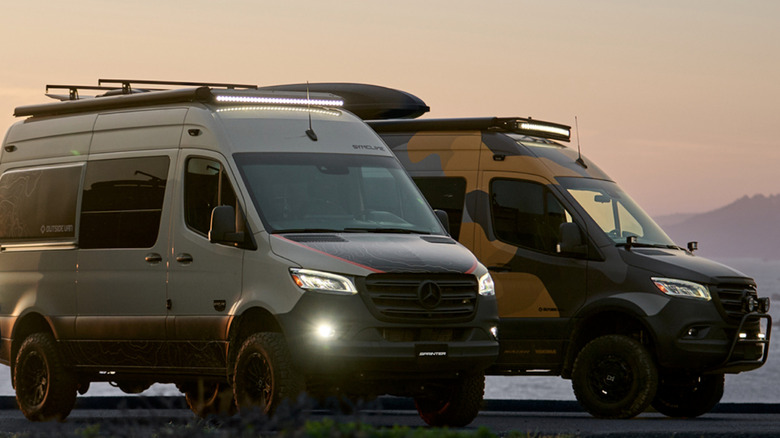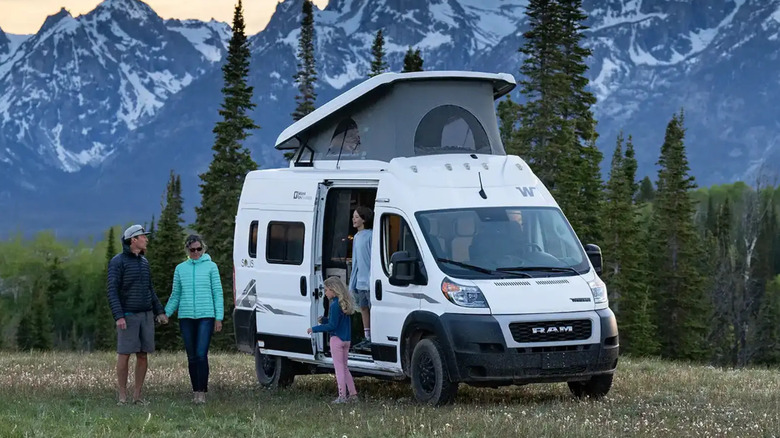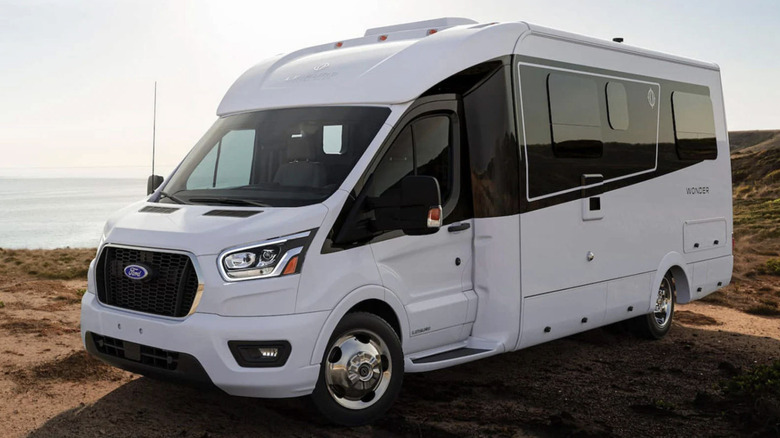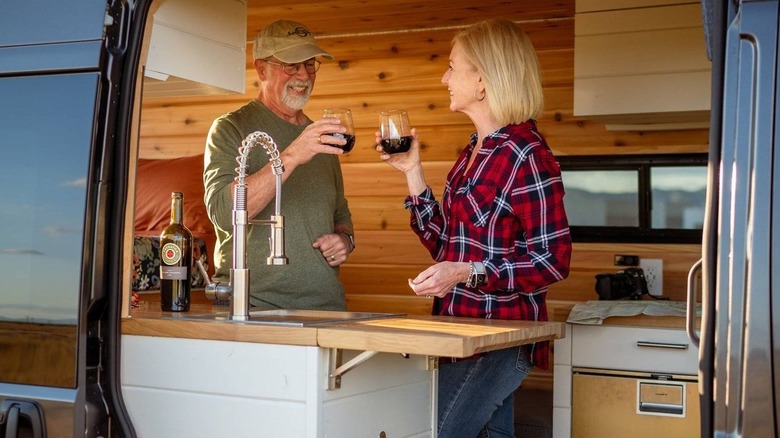Are Travel Vans & Campers The Same Thing? Here's What You Need To Know
With warmer weather comes the desire to take to the road and explore new places — just don't forget your stress-free traveling apps. You can do this in many different ways, from booking an Airbnb to tent camping in nature. However, mobile accommodations are still a popular option given how many are on the road at any given time. But the question is, what kind is better for you and your family's needs?
Travel vans, camper vans, campers, travel trailers, and RVs. There are many terms when it comes to mobile arrangements, and though they are all on wheels, that doesn't mean they are all the same thing. In fact, travel vans and camper vans are completely different than their counterpart campers and RVs. Whether you're looking to live as a digital nomad or wanting to invest in something fun to use during long weekends, it's important to understand the key differences between a travel van and a camper.
Design and structure
Travel vans, also known as camper vans, tend to be more compact and easier to maneuver. Usually, they are built off the frame of a standard van — the most popular being from the chassis of a Ford, Mercedes, or Dodge. However, sometimes you will see more fun builds in an older Volkswagen van.
Though there are several companies that specialize in van conversion, so you can get your travel van exactly how you want it, many times, people will do the remodel themselves. This can include adding a shower, a kitchenette, and even a lifted bed to accommodate more storage space underneath. If someone is traveling with pets, they'll even install dog crates under the bed. However, unless there are solar panels installed on the roof or unique decals displayed on the side, most of the changes are going to be interior. In fact, sometimes van lifers will refrain from customizing the outside at all, so they can achieve easier stealth camping.
A camper, on the other hand, is much more broad. It can be motorized, like a Class C RV, or it can be towed using a truck or SUV rated for towing. Campers come from the manufacturer ready to use, and many times, you can get customized features added while it's on the assembly line. However, unless you've opted for a small camper like teardrop style or a 13-foot Scamp, campers can be a bit on the bigger size, especially when they come with slide-outs.
Buying and conversion prices
We'll say it from the get-go. Unless you are okay with your travel van being used and minimal, purchasing one is not cheap. The starting price of a new Wonder from Leisure Travel Van is $187,620, and that's with rear twin beds, a bathroom, and a small kitchenette area.
You could always purchase a used utility van, which can run you anywhere from $20,000 and up, and then hire a company to build out your van for you. Some places will still run you a bit of money, though. For example, Vanlife Customs out of Arvada, Colorado sets its custom build range from $85,000 to $150,000, but you can use the building tool on the website to create exactly what you're looking for in your van. However, another company, Contra Vans out of Commerce City, Colorado, has a much more affordable starting price of $7,500. Keep in mind, though, that the cheaper the build-out price, the fewer frills and components that will be included.
Campers and RVs are not much different, especially if you're buying new and big. A Class A, which is a tour bus style, can run you anywhere from $100,000 and up. A brand-new Standard 13 foot travel trailer like a Scamp will cost you around $24,000. However, for both vans and campers, you can take the cheaper route and modify it yourself. From experience purchasing a used 2001 Scamp travel trailer, it costs $8,000 for the camper and another $6,000 to renovate the inside and add a whole solar setup.
Maintenance
Like anything that can break, maintenance is important, whether it is preventative or immediate. When it comes to maintenance differences between travel vans and campers, it's both the type of accommodation and what you're driving that factor in. For example, if you're driving around full-time in a Ford Transit with a gasoline engine, you would maintain it the same way you would a car with standard engine oil changes, brake checks, and more. Additionally, keep an eye on your suspension if you're constantly driving on washboard roads, and just like any vehicle, tires will need to be routinely rotated.
If you're towing a camper, maintenance is a bit different. For example, you'll want to consistently grease your bearings. Other things to look out for are checking the frame for rust, making sure seals are secure, and monitoring for any cracks from the weather.
Whether you're traveling in a travel van or a camper, if you're not using it during the winter, you'll want to look into winterizing it to prevent damage from freezing temperatures. This includes draining the water system and disconnecting your batteries to store in a warm place.
Typical uses of travel vans and campers
Of course, the primary use of both travel vans and campers is to camp out at campgrounds or dispersed camping areas, unless you're living in it full-time as a nomad. However, both types of accommodations have different uses. Travel vans give you the freedom of more mobility because of their smaller designs. Typically, many people who camp or live out of their vans only stay in a camping area for a few days. Additionally, while moving from place to place, it's easier to stay overnight in more populated areas because vans, at least utility-style vans, tend to blend in.
Bigger RVs and motorhomes don't have the same stealth luxury, though. Sometimes, you'll find them overnight camping in a Walmart parking lot, if allowed, but they tend not to have the ability to go to many places like a camper van or a smaller travel trailer can. On the other hand, towable campers can disconnect from the towing vehicle, so you're able to save your spot while having a vehicle to explore neighboring towns. However, no matter which style of camping vehicle you choose, just make sure you have the right accessories to make it more comfortable and secure.




